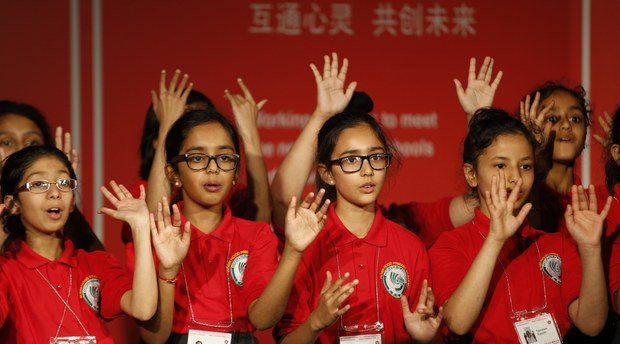UK Confucius Institutes enable ‘transnational repression,’ study says
Share

Children from the Robin Hood primary school in Birmingham perform a song in Mandarin for the Chinese President Xi Jinping who was attending the opening of the UCL Institute of Education Confucius Institute annual conference in London, Oct. 22, 2015.
Chinese staff at the so-called Confucius Institutes across the United Kingdom are recruited to enforce Chinese Communist Party (CCP) discipline and values in the country, new research has found.
The state-sponsored Confucius Institute program, named after the ancient Chinese philosopher, was established 20 years ago to promote Chinese language and culture overseas and support Chinese-language teaching. There are more than 530 institutes based at universities worldwide, 30 of them are in the U.K.
‘Are Confucius Institutes legal?’, a new report by the organization UK-China Transparency (UKCT), looked into the recruitment process for Chinese staff who would then be sent to work in Britain.
All Confucius Institutes are based in British universities in the form of partnerships between the local universities with Chinese counterparts, and the Centre for Language Cooperation and Exchange (CLEC), a central Chinese government agency.
UKCT studied documents and data from all British universities involved and found that “British universities are operating Confucius Institutes illegally and enabling transnational repression in the U.K.”
Most of the language teachers come from China, and the report said they “are being recruited based on their ability to enforce ‘CCP discipline’ in the U.K. and are obliged to undermine free speech and to conduct harassment on command.”
The Chinese government demands applicants for roles at Confucius Institutes fill in a special form, UKCT said, that requires applicants to provide details of their “political characteristics” and “ethnicity”; promise not to have a child whilst working abroad; have their current employer evaluate their “political attitude”; and be evaluated by a CCP Committee.
“These practices are illegal under U.K. law,” the report said.
The application form also demands that applicants must promise to abide by the laws of China while abroad, something the British host universities are not aware of.
“There is … a systematic risk of Confucius Institute staff involving themselves in transnational repression by subjecting vulnerable individuals in the U.K. to harassment or intimidation and undermining freedom of speech on campus,” the UKCT’s report said.
Tough on China?
It also alleged that the U.K. Home Office “is systematically enabling this by means of an unlawful dedicated visa route which makes the employment status of Confucius Institute staff unclear.”
In 2014, it launched a new kind of visa route called the ‘Overseas Government Language Programme’ visa scheme which, to date, applies solely to Mandarin-language teachers.
The scheme’s sponsor is a limited company based in London but under the control of the Chinese government.
The purpose of the Confucius Institute program is to “advance the CCP interests,” the report said.
Last July, when running for the leadership of the Conservative Party, the incumbent Prime Minister Rishi Sunak pledged that he’d “close all 30 of China’s Confucius Institutes in the U.K.”
“Almost all U.K. government spending on Mandarin language teaching at school is channeled through university-based Confucius Institutes, thereby promoting Chinese soft power,” Sunak tweeted on July 25, 2022.
So far none of the institutes has been closed.
Rishi Sunak, before becoming prime minister, also claimed that “China and the Chinese Communist Party represent the largest threat to Britain and the world’s security and prosperity this century.”
Yet in the latest annual keynote speech on April 25, ‘Our position on China’, his foreign secretary argued that to isolate China “would be a betrayal of our national interest and a wilful misunderstanding of the modern world.”
James Cleverly said that British officials “have an obligation to future generations to engage” robustly and also constructively with Beijing as “we must face the inescapable reality that no significant global problem … can be solved without China.”
However, he said, the U.K. government “will strengthen our national security protections wherever Beijing’s actions pose a threat to our people or our prosperity.”
“We are not going to be silent about interference in our political system, or technology theft, or industrial sabotage. We will do more to safeguard academic freedom and research.”
“And when there are tensions with other objectives, we will always put our national security first,” the foreign secretary pledged.
In September 2022, Madrid-based non-governmental organization Safeguard Defenders reported that China is carrying out “illegal, transnational policing operations” via 54 so-called police service stations in 30 countries including three stations in the United Kingdom.
A minister at the U.K. Home Office confirmed in Parliament last week that law enforcement agencies are still investigating the allegations.
China’s foreign ministry meanwhile insisted that there are “simply no so-called overseas police stations.” A spokesman said the claims were “groundless accusations against China” and “clearly political manipulation.







